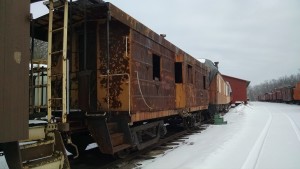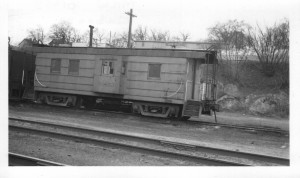Rib-Sided Bay Window Caboose, CMStP&P, 1939
Built in August 1939 at the Milwaukee Road’s Milwaukee, Wisconsin shops with the original number 01855. It is part of the first series of 75 rib sided cabooses, numbered 01800 through 01874. It was built with ribbed steel side sheets, meant to strengthen the caboose’s overall construction while keeping the weight of the car low. The bay window design allowed the crew to better see the sides of their train, as freight equipment was getting larger and taller during this time, and was safer for the crew as they stayed at floor level. Original cost to build in 1939 was approximately $3,200 which would be about $54,100 today (2016 dollars). It was configured with a conductor’s desk, Aladdin kerosene lamp, three side benches, and two Dayton seats, ice box, water cooler, sink, Estate Coal Stove and coal box, dry hopper toilet, three clothes lockers, and oil and tool lockers. The Milwaukee Road was able to keep the cost of the cabooses low, by fabricating many of the components themselves, including the use of smooth riding passenger car trucks they designed in 1934 for use on branch line combination passenger cars and Express cars.
At some point, the caboose was upgraded with an oil stove with an externally filled oil tank which required some rearrangement of internal features, and had its original “K-1” airbrakes updated with more modern A/B brakes as required by law at the time. Otherwise, the caboose is largely as built. Eventually, in the 1970’s, the Milwaukee’s new computer system required the car be renumbered to 991855. During the late 1970’s the car was assigned to the Portage, WI area, until it was bad ordered and retired in April of 1982. It was finally sold by the Milwaukee in July of 1985 for scrap. Purchased in November 2007 by Mid-Continent members, it was brought to the property and is currently privately owned. It is being restored for use as a bunk facility.


